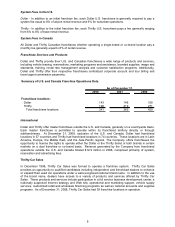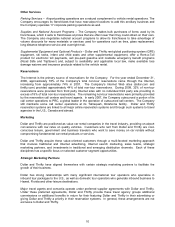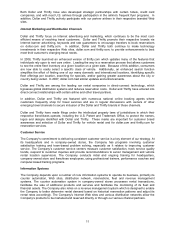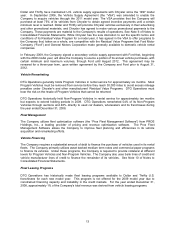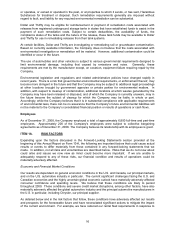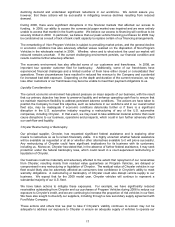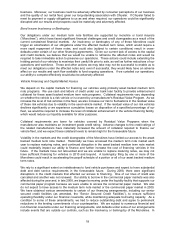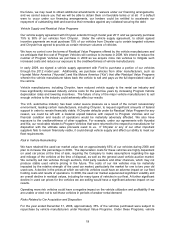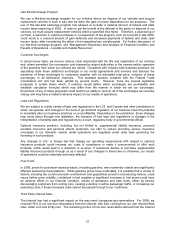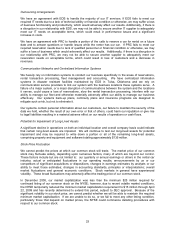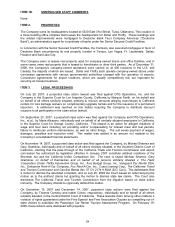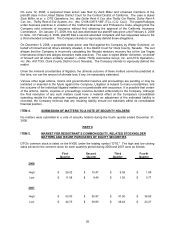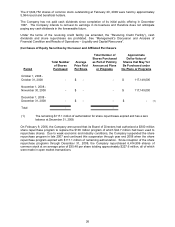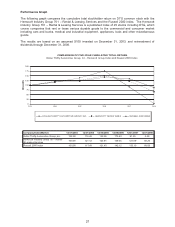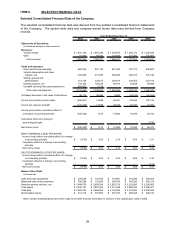Thrifty Car Rental 2008 Annual Report Download - page 21
Download and view the complete annual report
Please find page 21 of the 2008 Thrifty Car Rental annual report below. You can navigate through the pages in the report by either clicking on the pages listed below, or by using the keyword search tool below to find specific information within the annual report.the future, we may need to obtain additional amendments or waivers under our financing arrangements,
and we cannot assure you that we will be able to obtain them on favorable terms or at all. If a default
were to occur under our financing arrangements, our lenders could be entitled to accelerate our
repayment of outstanding debt and exercise their remedies against any collateral securing the debt.
Vehicle Supply and Residual Value Programs
Our vehicle supply agreement with Chrysler extends through model year 2011 and we generally purchase
75% to 90% of our vehicles from Chrysler. Under the vehicle supply agreement, to obtain agreed
incentive payments we must purchase 75% of our vehicles from Chrysler up to certain targeted volumes
and Chrysler has agreed to provide us certain minimum volumes of vehicles.
We have no control over the terms of Residual Value Programs offered by the vehicle manufacturers and
we anticipate that the cost of Program Vehicles will continue to increase in 2009. We intend to reduce the
number of Program Vehicles we purchase in 2009 as we acquire more risk vehicles to mitigate such
increased costs and reduce our exposure to the creditworthiness of vehicle manufacturers.
In early 2009, we signed a vehicle supply agreement with Ford to purchase a portion of our vehicles
through the 2012 model year. Additionally, we purchase vehicles from other manufacturers, such as
Hyundai Motor America (“Hyundai”) and Kia Motors America (“Kia”) that offer Residual Value Programs
wherein the vehicle manufacturer takes back the vehicle to sell and pays us the full depreciated value of
the vehicle.
Vehicle manufacturers, including Chrysler, have reduced vehicle supply to the rental car industry and
have significantly increased industry vehicle costs for the past few years by increasing Program Vehicle
depreciation rates and lowering incentives. The failure of any of the major vehicle manufacturers to sell
enough vehicles to the industry could adversely affect our results.
The U.S. automotive industry has been under severe pressure as a result of the current recessionary
environment, leading certain manufacturers, including Chrysler, to request significant amounts of federal
support in order to remain financially viable. If Chrysler defaults under its Residual Value Program for any
reason, we could be left with a material unpaid balance with respect to Program Vehicles and our
financial condition and results of operations would be materially adversely affected. We also have
exposure to the creditworthiness of other suppliers. For example, under our agreements with Hyundai
and Kia, our receivable relates to Program Vehicles that were returned to the respective manufacturer for
disposition with the ultimate sales proceeds owed to us. If Chrysler or any of our other important
suppliers fails to remain financially viable, it could disrupt vehicle supply and affect our ability to meet our
fleet requirements.
Risk in Vehicle Remarketing
We have retained the used car market value risk on approximately 65% of our vehicles during 2008 and
plan to increase this percentage in 2009. The depreciation costs for these vehicles are highly dependent
on used car prices at the time of sale, requiring the Company to make assumptions regarding the age
and mileage of the vehicles at the time of disposal, as well as the general used vehicle auction market.
We currently sell risk vehicles through auctions, third party resellers and other channels, which may not
produce stable used vehicle pricing in the future. The costs of our risk vehicles may be materially
impacted by the relative strength of the used car market, particularly the market for one to two year old
used cars. A decline in the prices at which we sell risk vehicles could have an adverse impact on our fleet
holding costs and results of operations. In 2008, the used car market experienced significant volatility and
an overall decline in residual values, including for many types of vehicles in our fleet. A further significant
decline in used car prices for the vehicles we are selling would have a significant adverse impact on our
results.
Operating more risk vehicles could have a negative impact on the vehicle utilization and profitability if we
are unable or elect not to sell those vehicles in periods of weaker rental demand.
Risks Related to Car Acquisition and Disposition
For the year ended December 31, 2008, approximately 35% of the vehicles purchased were subject to
repurchase by vehicle manufacturers under Residual Value Programs. Under these Programs, vehicle
19


